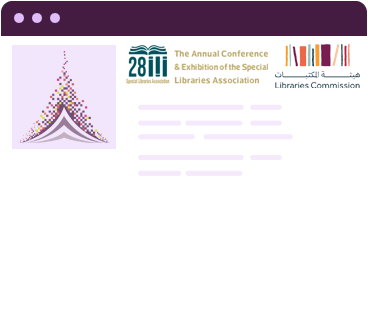About 27th Annual Conference







For decades, interest in the field of libraries and information sciences has been developing and affected by modern innovations, especially in the technological fields and their inputs, the most important of which is intelligent technologies. Information institutions have adopted and used these technologies to enhance and manage their collections, improve and diversify the services provided to their visitors, improve their interaction with them, and develop solutions to address the challenges that accompany them. As a matter of fact, libraries and information institutions have become among the institutions most affected by applications and smart technologies in their work, services, security, and access to beneficiaries at all times in new creative ways.
The content, place, people, services, and tools in information institutions have been affected by smart technologies, and new concepts have emerged such as the smart library, the library of the future, and the smart cities library. This development has placed an additional burden on those in charge of academic programs in information studies disciplines, with their various names, in order to interact and contribute to the development of appropriate programs that meet the needs of library and information specialists and develop their skills and capabilities.
The twenty-seventh conference of the Special Libraries Association - Arab Gulf Chapter comes to address these trends, developments and challenges; and presents a recent and important topic according to specific axes that prompt researchers and specialists to choose and participate in research according to interests.
Scientific Committee, Chairman
E-Mail: ayman.alhabshi@gmail.com
E-Mail:asarmih@hotmail.com